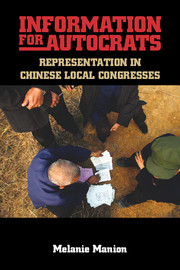Book contents
- Frontmatter
- Dedication
- Contents
- Tables and Figures
- Acknowledgments
- Introduction
- 1 Institutional Design
- 2 Selectoral Connection
- 3 Authoritarian Parochialism
- 4 Putative Principals
- 5 Independent Candidates
- Conclusion
- Appendix A Interviews and Surveys
- Appendix B Reliability Check on Delegate Self-Reports
- Appendix C Searching Independent Candidates on Sina Weibo
- Works Cited
- Index
- Miscellaneous Endmatter
Introduction
Published online by Cambridge University Press: 05 December 2015
- Frontmatter
- Dedication
- Contents
- Tables and Figures
- Acknowledgments
- Introduction
- 1 Institutional Design
- 2 Selectoral Connection
- 3 Authoritarian Parochialism
- 4 Putative Principals
- 5 Independent Candidates
- Conclusion
- Appendix A Interviews and Surveys
- Appendix B Reliability Check on Delegate Self-Reports
- Appendix C Searching Independent Candidates on Sina Weibo
- Works Cited
- Index
- Miscellaneous Endmatter
Summary
Long after the third wave of democratization that began in the mid-1970s, autocracies abound: by a recent count (Svolik 2012), autocratic regimes are in place in nearly 40 percent of countries. The modal variant now is electoral authoritarianism, in which opposition parties regularly compete against a ruling party in elections that are organized to prevent alternation of power. Even in far more repressive military, monarchical, and single-party autocracies, however, rulers have opened the political playing field to more players through nominally democratic institutions, such as elections and congresses. China, the most powerful autocracy, is no exception.
This book investigates the new representation unfolding in Chinese local congresses that, since 1980, are popularly elected in elections featuring legally mandated contestation, secret ballots, and voter nomination of candidates. Chinese congresses disappeared in 1966, with the radical attack on all institutions except the army in the Cultural Revolution engineered by Mao. In the late 1970s, after twelve chaotic years, the congresses were reinstated and renewed. Elections and congresses are not defining features of Chinese autocracy today—far from it. Even so, although rulers in Beijing regularly proclaim their rejection of liberal democratic values, post-Mao political reform includes nominally democratic institutions, such as elections and congresses. I show in this book that the priorities and problems of ordinary Chinese at the grassroots significantly influence both who gets elected to township and county congresses and what the congresses do after they are elected. I argue that these outcomes are the result of rules—or, more precisely old and new institutionalized arrangements. Presumably, Chinese autocrats, at the top of a single-party political hierarchy modeled on Leninist principles, have not organized themselves to undermine the foundations of their Communist Party state. Do arrangements that motivate the powerful to respond to ordinary citizens strengthen autocracy? If so, how? In answering these questions, I rethink the Chinese model of “authoritarian resilience” (Nathan 2003, 2006), a touchstone or foil in much scholarship on Chinese politics, and contribute to a growing literature on the comparative politics of authoritarianism.
Key Findings
From what we know, nominally democratic institutions are a good wager for autocrats: elections in autocracies are associated not with democratic transition (Brownlee 2007) but with regime longevity (Geddes 1999), and congresses are associated with growth (Gandhi 2008).
- Type
- Chapter
- Information
- Information for AutocratsRepresentation in Chinese Local Congresses, pp. 1 - 24Publisher: Cambridge University PressPrint publication year: 2015



